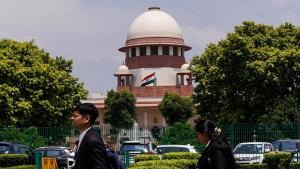
Follow WOWNEWS 24x7 on:

In a critical and timely step toward addressing the escalating mental health crisis among students nationwide, the Supreme Court of India has empowered its National Task Force on Student Mental Health by appointing State Nodal Officers across the country. This pivotal move aims to ensure coordinated efforts in tackling student suicides, academic pressures, and psychological well-being within Higher Education Institutions (HEIs). With over one lakh students already under its scope, this initiative marks a comprehensive and systemic response to safeguarding young lives and supporting mental health in academic settings. This newsletter explores the formation, mandate, and significance of the Supreme Court’s panel and its recent developments.
Key Highlights Of The Supreme Court’s Mental Health Initiative
Appointment Of State Nodal Officers
The Supreme Court’s National Task Force, chaired by former Justice S. Ravindra Bhat, has tasked states to nominate senior officers (not below Joint Secretary rank) as State Nodal Officers responsible for implementing mental health strategies, streamlining data collection, and liaising with educational bodies.
Extensive Student Coverage
Currently, the panel’s purview extends to safeguarding the mental health of over 1,00,000 students across various state universities, central universities, private colleges, technical institutes, and other higher education centers.
Multi-disciplinary Composition Of The Task Force
Experts from social sciences, clinical psychology, gender studies, disability rights, community health, and education form the task force, ensuring holistic perspectives in policy recommendations.
Focused Objectives And Mandate Of The National Task Force
Preventing Student Suicides And Mental Health Crisis
The core aim is to develop a national action plan for mental health services, establish early intervention and distress detection mechanisms, and enforce robust support systems within all HEIs.
Addressing Root Causes Such As Discrimination And Harassment
The panel investigates causes including ragging, caste and gender discrimination, academic stress, financial hardships, and social exclusion that contribute to poor mental health outcomes.
Policy Review And Legal Recommendations
It reviews existing welfare policies across HEIs, recommending legal reforms to enhance protections under laws like the SC/ST (Prevention of Atrocities) Act, 1989, and other relevant legislation that impact student well-being.
Implementation Strategies And Coordination Efforts
Creation Of Dedicated Mental Health Portals
Digital platforms will be launched for data collection, grievance redressal, and awareness campaigns to facilitate transparency and stakeholder engagement.
Capacity Building And Training
Workshops and training programs for faculty, administrative staff, and counselors across institutions aim to enhance mental health literacy and responsiveness.
Regular Reporting And Accountability
The task force mandates periodic inspections, data submission by institutions, and interim reporting to monitor progress and compliance.
Significance For The Education Sector And Society
Fulfilling Constitutional Rights
The Supreme Court reaffirmed student mental health as an integral part of the fundamental right to life under Article 21, paving the way for education systems to adopt mental health as a priority.
Enhancing Student Safety And Equality
By combating systemic issues like harassment and discrimination, the initiative strives towards creating safer, more inclusive academic spaces critical for learning and personal growth.
Encouraging Stakeholder Collaboration
The success of the program hinges on coordinated efforts between governments, educational institutions, students’ unions, mental health professionals, and civil society organizations.
Looking Ahead: Challenges And Future Directions
Sustaining this ambitious agenda will require continuous financial support, policy enforcement, and cultural change in attitudes toward mental health. The interim report by July 2025 and the final recommendations later in the year will set the roadmap for further improvements. Successful implementation will not only save lives but also improve educational outcomes and nurture holistic development among India’s youth.
Conclusion
The Supreme Court’s proactive formation of a National Task Force and appointment of State Nodal Officers marks an unprecedented commitment to combat student mental health challenges and suicides. With over one lakh students presently under its ambit, this pioneering initiative aims to build a safer, healthier, and more supportive learning environment across India’s Higher Education Institutions. Continued vigilance, collaboration, and compassion from all stakeholders remain essential to transform this directive into meaningful change for future generations.
Sources: Press Information Bureau, The Hindu, Hindustan Times, Doon Law Mentor



